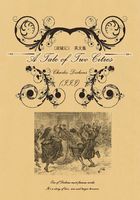'Within so many yards of this Covent-garden lodging of mine, as within so many yards of Westminster Abbey, Saint Paul's Cathedral, the Houses of Parliament, the Prisons, the Courts of Justice, all the Institutions that govern the land, I can find-must find, whether I will or no-in the open streets, shameful instances of neglect of children, intolerable toleration of the engenderment of paupers, idlers, thieves, races of wretched and destructive cripples both in body and mind, a misery to themselves, a misery to the community, a disgrace to civilisation, and an outrage on Christianity.-I know it to be a fact as easy of demonstration as any sum in any of the elementary rules of arithmetic, that if the State would begin its work and duty at the beginning, and would with the strong hand take those children out of the streets, while they are yet children, and wisely train them, it would make them a part of England's glory, not its shame-of England's strength, not its weakness-would raise good soldiers and sailors, and good citizens, and many great men, out of the seeds of its criminal population. Yet I go on bearing with the enormity as if it were nothing, and I go on reading the Parliamentary Debates as if they were something, and I concern myself far more about one railway-bridge across a public thoroughfare, than about a dozen generations of scrofula, ignorance, wickedness, prostitution, poverty, and felony. I can slip out at my door, in the small hours after any midnight, and, in one circuit of the purlieus of Covent-garden Market, can behold a state of infancy and youth, as vile as if a Bourbon sat upon the English throne; a great police force looking on with authority to do no more than worry and hunt the dreadful vermin into corners, and there leave them. Within the length of a few streets I can find a workhouse, mismanaged with that dull short-sighted obstinacy that its greatest opportunities as to the children it receives are lost, and yet not a farthing saved to any one. But the wheel goes round, and round, and round; and because it goes round-so I am told by the politest authorities-it goes well.'
Thus I reflected, one day in the Whitsun week last past, as I floated down the Thames among the bridges, looking-not inappropriately-at the drags that were hanging up at certain dirty stairs to hook the drowned out, and at the numerous conveniences provided to facilitate their tumbling in. My object in that uncommercial journey called up another train of thought, and it ran as follows:
'When I was at school, one of seventy boys, I wonder by what secret understanding our attention began to wander when we had pored over our books for some hours. I wonder by what ingenuity we brought on that confused state of mind when sense became nonsense, when figures wouldn't work, when dead languages wouldn't construe, when live languages wouldn't be spoken, when memory wouldn't come, when dulness and vacancy wouldn't go. I cannot remember that we ever conspired to be sleepy after dinner, or that we ever particularly wanted to be stupid, and to have flushed faces and hot beating heads, or to find blank hopelessness and obscurity this afternoon in what would become perfectly clear and bright in the freshness of to-morrow morning. We suffered for these things, and they made us miserable enough. Neither do I remember that we ever bound ourselves by any secret oath or other solemn obligation, to find the seats getting too hard to be sat upon after a certain time; or to have intolerable twitches in our legs, rendering us aggressive and malicious with those members; or to be troubled with a similar uneasiness in our elbows, attended with fistic consequences to our neighbours; or to carry two pounds of lead in the chest, four pounds in the head, and several active blue-bottles in each ear. Yet, for certain, we suffered under those distresses, and were always charged at for labouring under them, as if we had brought them on, of our own deliberate act and deed. As to the mental portion of them being my own fault in my own case-I should like to ask any well-trained and experienced teacher, not to say psychologist. And as to the physical portion-I should like to ask PROFESSOR OWEN.'
It happened that I had a small bundle of papers with me, on what is called 'The Half-Time System' in schools. Referring to one of those papers I found that the indefatigable MR. CHADWICK had been beforehand with me, and had already asked Professor Owen: who had handsomely replied that I was not to blame, but that, being troubled with a skeleton, and having been constituted according to certain natural laws, I and my skeleton were unfortunately bound by those laws even in school-and had comported ourselves accordingly. Much comforted by the good Professor's being on my side, I read on to discover whether the indefatigable Mr. Chadwick had taken up the mental part of my afflictions. I found that he had, and that he had gained on my behalf, SIR BENJAMIN BRODIE, SIR DAVID WILKIE, SIR WALTER SCOTT, and the common sense of mankind. For which I beg Mr. Chadwick, if this should meet his eye, to accept my warm acknowledgments.
Up to that time I had retained a misgiving that the seventy unfortunates of whom I was one, must have been, without knowing it, leagued together by the spirit of evil in a sort of perpetual Guy Fawkes Plot, to grope about in vaults with dark lanterns after a certain period of continuous study. But now the misgiving vanished, and I floated on with a quieted mind to see the Half-Time System in action. For that was the purpose of my journey, both by steamboat on the Thames, and by very dirty railway on the shore. To which last institution, I beg to recommend the legal use of coke as engine-fuel, rather than the illegal use of coal; the recommendation is quite disinterested, for I was most liberally supplied with small coal on the journey, for which no charge was made. I had not only my eyes, nose, and ears filled, but my hat, and all my pockets, and my pocket-book, and my watch.
The V.D.S.C.R.C. (or Very Dirty and Small Coal Railway Company) delivered me close to my destination, and I soon found the Half-Time System established in spacious premises, and freely placed at my convenience and disposal.
What would I see first of the Half-Time System? I chose Military Drill. 'Atten-tion!' Instantly a hundred boys stood forth in the paved yard as one boy; bright, quick, eager, steady, watchful for the look of command, instant and ready for the word. Not only was there complete precision-complete accord to the eye and to the ear-but an alertness in the doing of the thing which deprived it, curiously, of its monotonous or mechanical character. There was perfect uniformity, and yet an individual spirit and emulation. No spectator could doubt that the boys liked it. With non-commissioned officers varying from a yard to a yard and a half high, the result could not possibly have been attained otherwise. They marched, and counter-marched, and formed in line and square, and company, and single file and double file, and performed a variety of evolutions; all most admirably. In respect of an air of enjoyable understanding of what they were about, which seems to be forbidden to English soldiers, the boys might have been small French troops. When they were dismissed and the broadsword exercise, limited to a much smaller number, succeeded, the boys who had no part in that new drill, either looked on attentively, or disported themselves in a gymnasium hard by. The steadiness of the broadsword boys on their short legs, and the firmness with which they sustained the different positions, was truly remarkable.
The broadsword exercise over, suddenly there was great excitement and a rush. Naval Drill!
In the corner of the ground stood a decked mimic ship, with real masts, yards, and sails-mainmast seventy feet high. At the word of command from the Skipper of this ship-a mahogany-faced Old Salt, with the indispensable quid in his cheek, the true nautical roll, and all wonderfully complete-the rigging was covered with a swarm of boys: one, the first to spring into the shrouds, outstripping all the others, and resting on the truck of the main-topmast in no time.
And now we stood out to sea, in a most amazing manner; the Skipper himself, the whole crew, the Uncommercial, and all hands present, implicitly believing that there was not a moment to lose, that the wind had that instant chopped round and sprung up fair, and that we were away on a voyage round the world. Get all sail upon her! With a will, my lads! Lay out upon the main-yard there! Look alive at the weather earring! Cheery, my boys! Let go the sheet, now! Stand by at the braces, you! With a will, aloft there! Belay, starboard watch! Fifer! Come aft, fifer, and give 'em a tune! Forthwith, springs up fifer, fife in hand-smallest boy ever seen-big lump on temple, having lately fallen down on a paving-stone-gives 'em a tune with all his might and main. Hoo-roar, fifer! With a will, my lads! Tip 'em a livelier one, fifer! Fifer tips 'em a livelier one, and excitement increases. Shake 'em out, my lads! Well done! There you have her! Pretty, pretty! Every rag upon her she can carry, wind right astarn, and ship cutting through the water fifteen knots an hour!
At this favourable moment of her voyage, I gave the alarm 'A man overboard!' (on the gravel), but he was immediately recovered, none the worse. Presently, I observed the Skipper overboard, but forbore to mention it, as he seemed in no wise disconcerted by the accident. Indeed, I soon came to regard the Skipper as an amphibious creature, for he was so perpetually plunging overboard to look up at the hands aloft, that he was oftener in the bosom of the ocean than on deck. His pride in his crew on those occasions was delightful, and the conventional unintelligibility of his orders in the ears of uncommercial landlubbers and loblolly boys, though they were always intelligible to the crew, was hardly less pleasant. But we couldn't expect to go on in this way for ever; dirty weather came on, and then worse weather, and when we least expected it we got into tremendous difficulties. Screw loose in the chart perhaps-something certainly wrong somewhere-but here we were with breakers ahead, my lads, driving head on, slap on a lee shore! The Skipper broached this terrific announcement in such great agitation, that the small fifer, not fifeing now, but standing looking on near the wheel with his fife under his arm, seemed for the moment quite unboyed, though he speedily recovered his presence of mind. In the trying circumstances that ensued, the Skipper and the crew proved worthy of one another. The Skipper got dreadfully hoarse, but otherwise was master of the situation. The man at the wheel did wonders; all hands (except the fifer) were turned up to wear ship; and I observed the fifer, when we were at our greatest extremity, to refer to some document in his waistcoat-pocket, which I conceived to be his will. I think she struck. I was not myself conscious of any collision, but I saw the Skipper so very often washed overboard and back again, that I could only impute it to the beating of the ship. I am not enough of a seaman to describe the manoeuvres by which we were saved, but they made the Skipper very hot (French polishing his mahogany face) and the crew very nimble, and succeeded to a marvel; for, within a few minutes of the first alarm, we had wore ship and got her off, and were all a-tauto-which I felt very grateful for: not that I knew what it was, but that I perceived that we had not been all a-tauto lately. Land now appeared on our weather-bow, and we shaped our course for it, having the wind abeam, and frequently changing the man at the helm, in order that every man might have his spell. We worked into harbour under prosperous circumstances, and furled our sails, and squared our yards, and made all ship-shape and handsome, and so our voyage ended. When I complimented the Skipper at parting on his exertions and those of his gallant crew, he informed me that the latter were provided for the worst, all hands being taught to swim and dive; and he added that the able seaman at the main-topmast truck especially, could dive as deep as he could go high.
The next adventure that befell me in my visit to the Short-Timers, was the sudden apparition of a military band. I had been inspecting the hammocks of the crew of the good ship, when I saw with astonishment that several musical instruments, brazen and of great size, appeared to have suddenly developed two legs each, and to be trotting about a yard. And my astonishment was heightened when I observed a large drum, that had previously been leaning helpless against a wall, taking up a stout position on four legs. Approaching this drum and looking over it, I found two boys behind it (it was too much for one), and then I found that each of the brazen instruments had brought out a boy, and was going to discourse sweet sounds. The boys-not omitting the fifer, now playing a new instrument-were dressed in neat uniform, and stood up in a circle at their music-stands, like any other Military Band. They played a march or two, and then we had Cheer boys, Cheer, and then we had Yankee Doodle, and we finished, as in loyal duty bound, with God save the Queen. The band's proficiency was perfectly wonderful, and it was not at all wonderful that the whole body corporate of Short-Timers listened with faces of the liveliest interest and pleasure.
What happened next among the Short-Timers? As if the band had blown me into a great class-room out of their brazen tubes, in a great class-room I found myself now, with the whole choral force of Short-Timers singing the praises of a summer's day to the harmonium, and my small but highly respected friend the fifer blazing away vocally, as if he had been saving up his wind for the last twelvemonth; also the whole crew of the good ship Nameless swarming up and down the scale as if they had never swarmed up and down the rigging. This done, we threw our whole power into God bless the Prince of Wales, and blessed his Royal Highness to such an extent that, for my own Uncommercial part, I gasped again when it was over. The moment this was done, we formed, with surpassing freshness, into hollow squares, and fell to work at oral lessons as if we never did, and had never thought of doing, anything else.
Let a veil be drawn over the self-committals into which the Uncommercial Traveller would have been betrayed but for a discreet reticence, coupled with an air of absolute wisdom on the part of that artful personage. Take the square of five, multiply it by fifteen, divide it by three, deduct eight from it, add four dozen to it, give me the result in pence, and tell me how many eggs I could get for it at three farthings apiece. The problem is hardly stated, when a dozen small boys pour out answers. Some wide, some very nearly right, some worked as far as they go with such accuracy, as at once to show what link of the chain has been dropped in the hurry. For the moment, none are quite right; but behold a labouring spirit beating the buttons on its corporeal waistcoat, in a process of internal calculation, and knitting an accidental bump on its corporeal forehead in a concentration of mental arithmetic! It is my honourable friend (if he will allow me to call him so) the fifer. With right arm eagerly extended in token of being inspired with an answer, and with right leg foremost, the fifer solves the mystery: then recalls both arm and leg, and with bump in ambush awaits the next poser. Take the square of three, multiply it by seven, divide it by four, add fifty to it, take thirteen from it, multiply it by two, double it, give me the result in pence, and say how many halfpence. Wise as the serpent is the four feet of performer on the nearest approach to that instrument, whose right arm instantly appears, and quenches this arithmetical fire. Tell me something about Great Britain, tell me something about its principal productions, tell me something about its ports, tell me something about its seas and rivers, tell me something about coal, iron, cotton, timber, tin, and turpentine. The hollow square bristles with extended right arms; but ever faithful to fact is the fifer, ever wise as the serpent is the performer on that instrument, ever prominently buoyant and brilliant are all members of the band. I observe the player of the cymbals to dash at a sounding answer now and then rather than not cut in at all; but I take that to be in the way of his instrument. All these questions, and many such, are put on the spur of the moment, and by one who has never examined these boys. The Uncommercial, invited to add another, falteringly demands how many birthdays a man born on the twenty-ninth of February will have had on completing his fiftieth year? A general perception of trap and pitfall instantly arises, and the fifer is seen to retire behind the corduroys of his next neighbours, as perceiving special necessity for collecting himself and communing with his mind. Meanwhile, the wisdom of the serpent suggests that the man will have had only one birthday in all that time, for how can any man have more than one, seeing that he is born once and dies once? The blushing Uncommercial stands corrected, and amends the formula. Pondering ensues, two or three wrong answers are offered, and Cymbals strikes up 'Six!' but doesn't know why. Then modestly emerging from his Academic Grove of corduroys appears the fifer, right arm extended, right leg foremost, bump irradiated. 'Twelve, and two over!'
The feminine Short-Timers passed a similar examination, and very creditably too. Would have done better perhaps, with a little more geniality on the part of their pupil-teacher; for a cold eye, my young friend, and a hard, abrupt manner, are not by any means the powerful engines that your innocence supposes them to be. Both girls and boys wrote excellently, from copy and dictation; both could cook; both could mend their own clothes; both could clean up everything about them in an orderly and skilful way, the girls having womanly household knowledge superadded. Order and method began in the songs of the Infant School which I visited likewise, and they were even in their dwarf degree to be found in the Nursery, where the Uncommercial walking-stick was carried off with acclamations, and where 'the Doctor'-a medical gentleman of two, who took his degree on the night when he was found at an apothecary's door-did the honours of the establishment with great urbanity and gaiety.
These have long been excellent schools; long before the days of the Short-Time. I first saw them, twelve or fifteen years ago. But since the introduction of the Short-Time system it has been proved here that eighteen hours a week of book-learning are more profitable than thirty-six, and that the pupils are far quicker and brighter than of yore. The good influences of music on the whole body of children have likewise been surprisingly proved. Obviously another of the immense advantages of the Short-Time system to the cause of good education is the great diminution of its cost, and of the period of time over which it extends. The last is a most important consideration, as poor parents are always impatient to profit by their children's labour.
It will be objected: Firstly, that this is all very well, but special local advantages and special selection of children must be necessary to such success. Secondly, that this is all very well, but must be very expensive. Thirdly, that this is all very well, but we have no proof of the results, sir, no proof.
On the first head of local advantages and special selection. Would Limehouse Hole be picked out for the site of a Children's Paradise? Or would the legitimate and illegitimate pauper children of the long-shore population of such a riverside district, be regarded as unusually favourable specimens to work with? Yet these schools are at Limehouse, and are the Pauper Schools of the Stepney Pauper Union.
On the second head of expense. Would sixpence a week be considered a very large cost for the education of each pupil, including all salaries of teachers and rations of teachers? But supposing the cost were not sixpence a week, not fivepence? it is FOURPENCE-HALFPENNY.
On the third head of no proof, sir, no proof. Is there any proof in the facts that Pupil Teachers more in number, and more highly qualified, have been produced here under the Short-Time system than under the Long-Time system? That the Short-Timers, in a writing competition, beat the Long-Timers of a first-class National School? That the sailor-boys are in such demand for merchant ships, that whereas, before they were trained, 10l. premium used to be given with each boy-too often to some greedy brute of a drunken skipper, who disappeared before the term of apprenticeship was out, if the ill-used boy didn't-captains of the best character now take these boys more than willingly, with no premium at all? That they are also much esteemed in the Royal Navy, which they prefer, 'because everything is so neat and clean and orderly'? Or, is there any proof in Naval captains writing 'Your little fellows are all that I can desire'? Or, is there any proof in such testimony as this: 'The owner of a vessel called at the school, and said that as his ship was going down Channel on her last voyage, with one of the boys from the school on board, the pilot said, "It would be as well if the royal were lowered; I wish it were down." Without waiting for any orders, and unobserved by the pilot, the lad, whom they had taken on board from the school, instantly mounted the mast and lowered the royal, and at the next glance of the pilot to the masthead, he perceived that the sail had been let down. He exclaimed, "Who's done that job?" The owner, who was on board, said, "That was the little fellow whom I put on board two days ago." The pilot immediately said, "Why, where could he have been brought up?" The boy had never seen the sea or been on a real ship before'? Or, is there any proof in these boys being in greater demand for Regimental Bands than the Union can meet? Or, in ninety-eight of them having gone into Regimental Bands in three years? Or, in twelve of them being in the band of one regiment? Or, in the colonel of that regiment writing, 'We want six more boys; they are excellent lads'? Or, in one of the boys having risen to be band-corporal in the same regiment? Or, in employers of all kinds chorusing, 'Give us drilled boys, for they are prompt, obedient, and punctual'? Other proofs I have myself beheld with these Uncommercial eyes, though I do not regard myself as having a right to relate in what social positions they have seen respected men and women who were once pauper children of the Stepney Union.
Into what admirable soldiers others of these boys have the capabilities for being turned, I need not point out. Many of them are always ambitious of military service; and once upon a time when an old boy came back to see the old place, a cavalry soldier all complete, with his spurs on, such a yearning broke out to get into cavalry regiments and wear those sublime appendages, that it was one of the greatest excitements ever known in the school. The girls make excellent domestic servants, and at certain periods come back, a score or two at a time, to see the old building, and to take tea with the old teachers, and to hear the old band, and to see the old ship with her masts towering up above the neighbouring roofs and chimneys. As to the physical health of these schools, it is so exceptionally remarkable (simply because the sanitary regulations are as good as the other educational arrangements), that when Mr. TUFNELL, the Inspector, first stated it in a report, he was supposed, in spite of his high character, to have been betrayed into some extraordinary mistake or exaggeration. In the moral health of these schools-where corporal punishment is unknown-Truthfulness stands high. When the ship was first erected, the boys were forbidden to go aloft, until the nets, which are now always there, were stretched as a precaution against accidents. Certain boys, in their eagerness, disobeyed the injunction, got out of window in the early daylight, and climbed to the masthead. One boy unfortunately fell, and was killed. There was no clue to the others; but all the boys were assembled, and the chairman of the Board addressed them. 'I promise nothing; you see what a dreadful thing has happened; you know what a grave offence it is that has led to such a consequence; I cannot say what will be done with the offenders; but, boys, you have been trained here, above all things, to respect the truth. I want the truth. Who are the delinquents?' Instantly, the whole number of boys concerned, separated from the rest, and stood out.
Now, the head and heart of that gentleman (it is needless to say, a good head and a good heart) have been deeply interested in these schools for many years, and are so still; and the establishment is very fortunate in a most admirable master, and moreover the schools of the Stepney Union cannot have got to be what they are, without the Stepney Board of Guardians having been earnest and humane men strongly imbued with a sense of their responsibility. But what one set of men can do in this wise, another set of men can do; and this is a noble example to all other Bodies and Unions, and a noble example to the State. Followed, and enlarged upon by its enforcement on bad parents, it would clear London streets of the most terrible objects they smite the sight with-myriads of little children who awfully reverse Our Saviour's words, and are not of the Kingdom of Heaven, but of the Kingdom of Hell.
Clear the public streets of such shame, and the public conscience of such reproach? Ah! Almost prophetic, surely, the child's jingle:
When will that be,
Say the bells of Step-ney!















